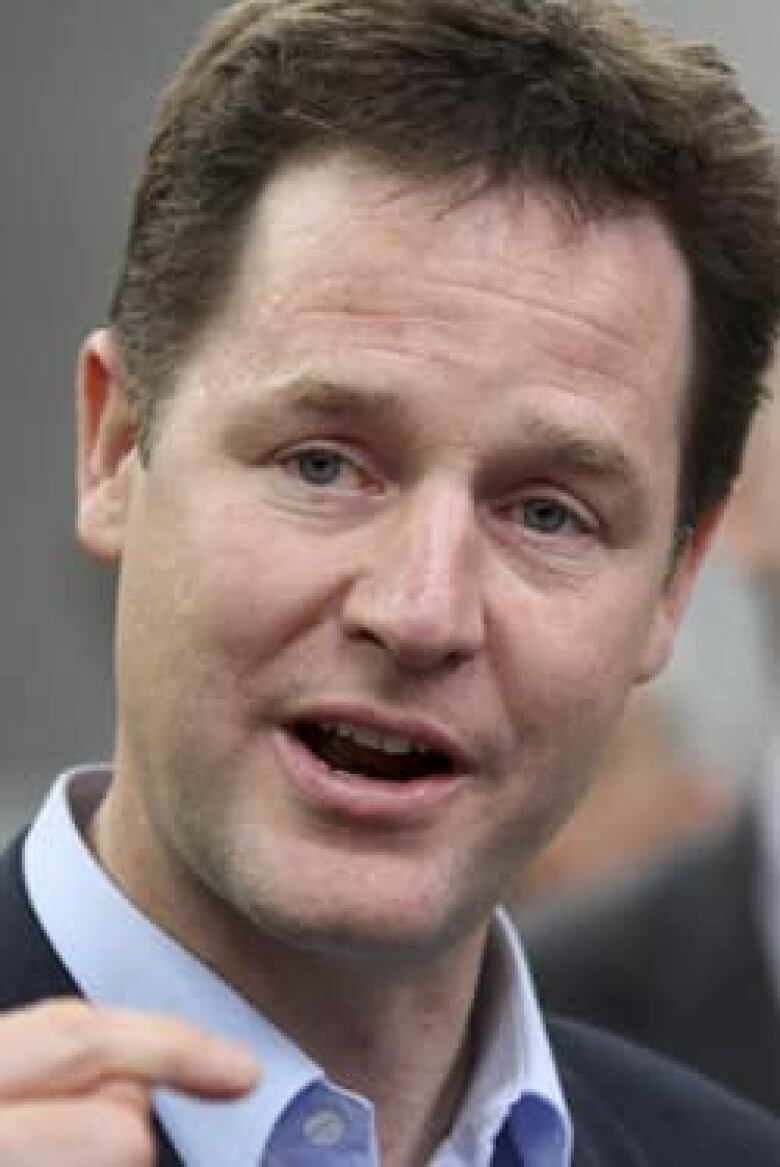An election even Monty Python could enjoy

At first, it looked as if this British campaign would be one of the dullest in years, an uninspiring contest between Labour, a party that has been in power since 1997, and its traditional, white-bread opposition, the Conservatives.

Ann MacMillan is the managing editor of the CBC's London Bureau.
There is a third party in U.K. politics, the Liberal Democrats. But like Canada's NDP it tends to get squeezed out in general elections.
With the British deficit at a record high, all of the parties seemed to recognize they had little room for economic manoeuvre and even the slogans had a bland sameness.
Labour promised "A future fair for all" while the Tories offered "Vote for change" and the Lib Dems "Change that works for you: Building a fairer Britain."
Suddenly, however, the campaign came alive.
For the first time in a British election, the three leaders agreed to a live debate on television.
Ten million people watched the first of the three debates on April 15 and the surprise winner was Nick Clegg, leader of the Liberal Democrats, who came across as articulate, sincere and different.

All of a sudden, Clegg-mania took hold among British voters and the Lib Dems shot up nearly 10 percentage points in the polls to the low 30s.
That put Clegg and his party neck and neck with Gordon Brown's Labour Party and David Cameron's Conservatives while talk of a hung Parliament, the British phrase for minority government, seemed to galvanize the electorate.
The 'bigot' gaffe
British voters, long used to the Labour and Conservative parties dominating political life here, discovered a credible alternative.
In the fresh-faced Clegg, who has only been an MP for a few years, Brown and Cameron found they had an unexpected opponent and the campaigning took on a new urgency.
The Scottish Brown, theformer chancellor of theexchequer who never looks comfortable meeting and greeting voters, took to the streets as never before. Not always with the best results.
Indeed, his encounter with pensioner Gillian Duffy last week may have cost him the election.
After Duffy grilled him about why so many immigrants were coming in from Eastern Europe, Brown walked away and, apparently forgetting that he was still wearing a TV microphone, muttered to an aide "That was a disaster" and that "she was just a sort of bigoted woman."
Theunguarded remark forced Brown to apologize and produced some of the best headlines of the campaign.
"Brown Toast" proclaimed the Sun, Britain's most popular tabloid.
The Independent newspaper ran a vicious cartoon of the Labour PM, his mouth morphed into a shotgun, shooting himself in the foot.
Sure hands?
Brown still hopes that when voters go to the polls on Thursday, May 6, they will vote for his "safe pair of hands" rather than the change promised by the other leaders.

The Conservatives' Cameron, who went into this election as the firm favourite, is now adding extra visits to his schedule to try to boost his vision of "big society, not big government."
He is promising to give people the power to run their own schools and elect police chiefs.
As for Clegg, he has surprised many observers by keeping up the Lib Dem momentum.
His party has the most radical platform including an amnesty for some asylum seekers, taxes on banks, "a mansion tax" on homes worth more than $3 million and closer ties with the European Union.
But Clegg's biggest attraction seems to be that he offers an alternative, something British voters appear to be craving.
Call for change
Labour has been in office now for 13 years and this most recent term has gone the full five-year limit.
What's more, a recent scandal of politicians abusing their legislative expenses has caused widespread public disillusionment. Some MPs claimed for such things as maintenance of a moat and mortgages on phantom homes.
When this election campaign started on April 6, voter apathy was seen as a real problem. Now that it's turned into a three-horse race, interest has increased noticeably.
With no clear winner in sight, informed betting is on a hung Parliament, with Clegg and his Liberal Democrats holding the balance of power.
If that happens, watch for demands to change the British electoral system.
Like Canada, Britain has a first-past-the-post system.
Whoever gets the most votes in a riding, wins, which, in this country, usually benefits Labour as most of its supporters are in the highly populated urban areas where there are more seats.
On Thursday, if each party receives, say, 30 per cent of the vote, Labour could end up with 315 seats, 48per cent of the total. In fact, some scenarios have Labour winning the most seats in a minority situation with as little as 27 per cent of the vote.
At this point, David Cameron still thinks he can win over enough undecided voters to become the next prime minister while Nick Clegg may be trying to maintain enough support to ensure that he becomes the kingmaker in a hung Parliament.
As for Gordon Brown, his big challenge could be to keep Labour from sinking so low in the polls that it replaces the Liberal Democrats as the third party in British politics.
Corrections
- An earlier version of this story said the Conservative campaign slogan was "Change That Works For You" and the Liberal Democrats was "Change We Can Believe In: Building a Fairer Future." In fact, the Conservative slogan is "Vote for change" and the Liberal Democrats is "Change that works for you: Building a fairer Britain."May 03, 2010 2:58 PM ET












_(720p).jpg)


 OFFICIAL HD MUSIC VIDEO.jpg)
.jpg)



























































































